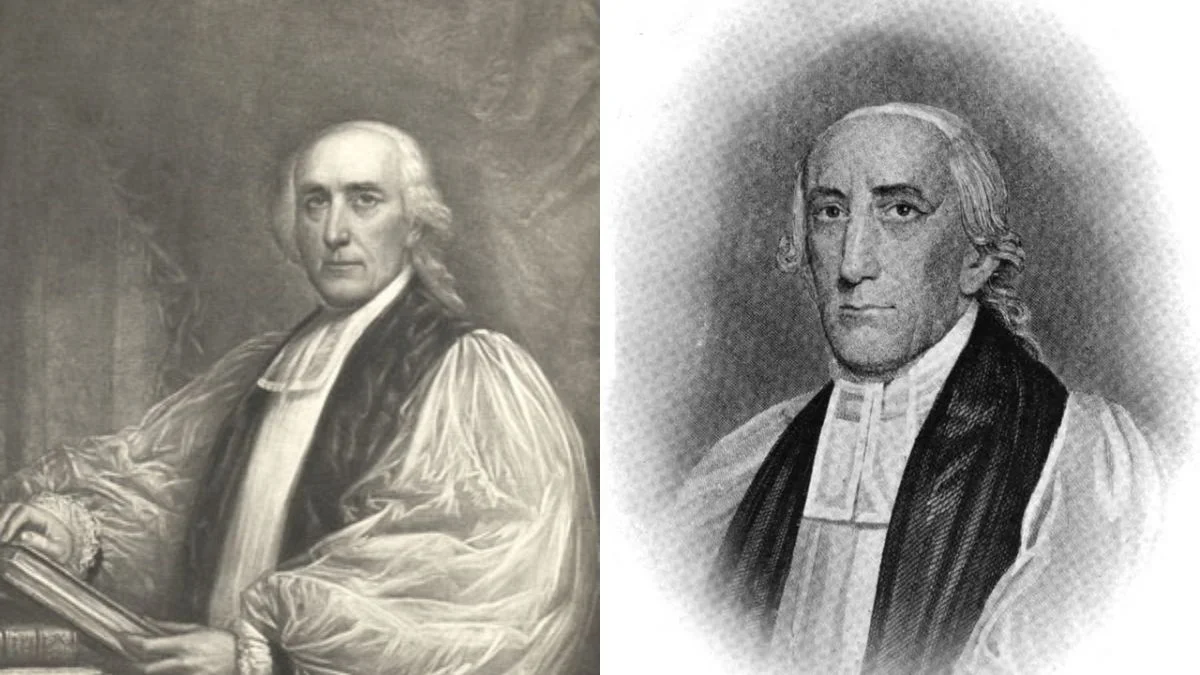Benjamin Moore, born on October 5, 1748, in Newtown, New York (now Elmhurst, Queens), was destined for a life marked by religious devotion and academic distinction. He was the son of Samuel Moore and Sarah Fish Moore, and his lineage was steeped in religious and pioneering heritage. Moore was the great-great-grandson of John Moore, a significant figure in early American religious history. John Moore was the first Independent minister allowed in New England, setting a precedent for religious leadership in the family. Additionally, Benjamin was the great-grandson of Capt. Samuel Moore, a notable figure known for cultivating the Newtown Pippin apple, a fruit that would become historically significant and commercially valuable.
This ancestry not only connected Moore to early American religious and agricultural innovation but also placed him in a lineage of individuals who had a lasting impact on their communities. The Moore family’s influence extended through various facets of life, from religious leadership to agricultural development, and this rich heritage undoubtedly shaped Benjamin Moore’s worldview and aspirations.
Education and Early Career
Moore’s education began in earnest at King’s College (now Columbia University), where he demonstrated academic excellence. His time at King’s College was formative, as it exposed him to the intellectual currents of the time and solidified his commitment to the Anglican Church. After graduating in 1768, Moore pursued further theological studies, eventually being ordained as a deacon in 1774 and as a priest shortly thereafter.
In 1775, not long after his return to America, Moore was appointed as an assistant rector at Trinity Church in New York City. Trinity Church, established in 1697, was the original Anglican church in the city, strategically located on Broadway at the western end of Wall Street. This position was significant, as Trinity Church was a central institution in the religious life of New York City, and Moore’s role there marked the beginning of his long and impactful career in the Episcopal Church.
Leadership During the Revolutionary War
The outbreak of the American Revolutionary War in 1775 brought significant challenges to religious institutions in the colonies. Moore’s appointment as president pro tempore of King’s College came at a tumultuous time. The arrival of the Continental Army in New York City in April 1776 forced the college to close and its members to disperse. Despite these challenges, Moore remained a steadfast leader, navigating the complexities of being a religious leader in a city occupied by British forces during the war.
The war years were a period of uncertainty and disruption for Moore and his congregation. However, his commitment to his faith and his parishioners never wavered. He continued to serve in Trinity Church, providing spiritual guidance and support to those who remained in the city. Moore’s resilience and leadership during this period were critical in maintaining the continuity of religious services and community support during a time of great upheaval.
Episcopal Leadership and Contributions to Columbia University
In 1801, Moore’s religious career reached its zenith when he was consecrated as the second Episcopal bishop of New York. His consecration was a momentous occasion, marking his elevation to one of the highest offices in the Episcopal Church. As bishop, Moore played a pivotal role in the expansion and consolidation of the Episcopal Church in New York during a period of rapid growth and change.
Benjamin Moore’s leadership extended beyond the church. In 1801, he was also appointed as the fifth President of Columbia University, the institution that had evolved from King’s College after the Revolutionary War. His tenure as president was marked by a commitment to the integration of religious principles with academic excellence. Under his leadership, Columbia University continued to develop as a leading institution of higher learning in the United States.
One of the most poignant moments of Benjamin Moore’s episcopal career came in 1804, when he was called upon to administer Holy Communion to Alexander Hamilton on his deathbed. Hamilton, one of the Founding Fathers of the United States and a close associate of George Washington, had been mortally wounded in a duel with Aaron Burr. Despite Hamilton’s reluctance to receive communion due to his lack of recent church attendance, Moore ultimately decided to administer the sacrament, providing spiritual comfort to the dying statesman. This act is often remembered as a significant moment in Moore’s ministry, illustrating his compassion and dedication to his faith.

Family Life and Legacy
Benjamin Moore’s personal life was closely intertwined with his professional achievements. He married Charity Clarke, and together they had several children, including Clement Clarke Moore, who would become renowned as the reputed author of the 1823 Christmas poem “A Visit from St. Nicholas.” This poem, more commonly known as “The Night Before Christmas,” has become one of the most beloved pieces of Christmas literature in the English-speaking world, contributing to the Moore family’s lasting legacy.
Clement Clarke Moore’s literary achievements, coupled with Benjamin Moore’s religious and academic contributions, highlight the family’s broad influence on American culture. The Moore family’s legacy is one of intellectual and spiritual leadership, with each generation contributing to the cultural and religious fabric of the nation.
Later Years and Death
Bishop Benjamin Moore’s later years were marked by continued service to both the church and Columbia University. His health, however, began to decline, leading to the appointment of John Henry Hobart as assistant bishop in 1811. Hobart would eventually succeed Moore as bishop, but Moore remained a respected and influential figure until his death.
Moore passed away on February 27, 1816, leaving behind a legacy of religious leadership, academic advancement, and cultural influence. His contributions to the Episcopal Church, Columbia University, and American society were profound, and his memory is honored in the annals of American history.
Conclusion: Benjamin Moore
Benjamin Moore’s life was one of dedication to faith, education, and leadership. From his early days in Newtown, New York, to his roles as Bishop of New York and President of Columbia University, Moore’s influence was far-reaching. His legacy is not only remembered through his contributions to the church and academia but also through his family, particularly his son Clement Clarke Moore, whose literary work continues to resonate with readers around the world.
In reflecting on Moore’s life, one sees the embodiment of the principles of service, resilience, and commitment to one’s faith and community. His impact on American religious and educational institutions remains a testament to his enduring legacy.









